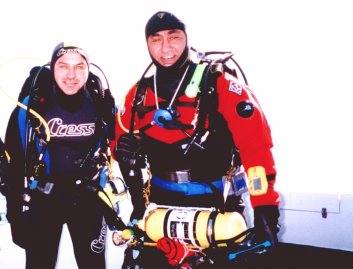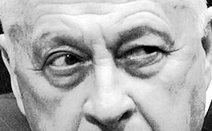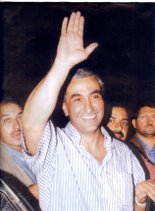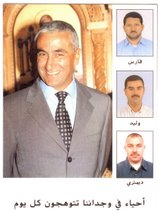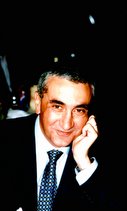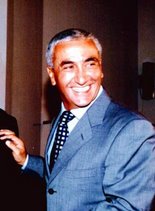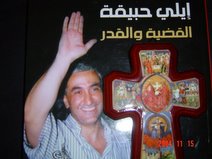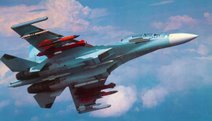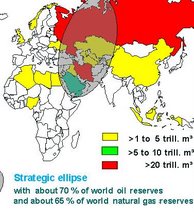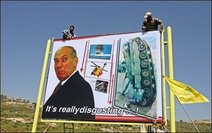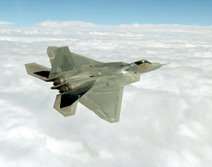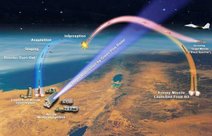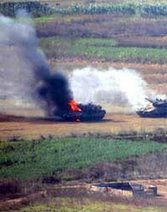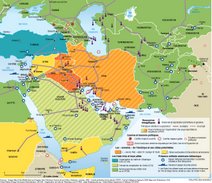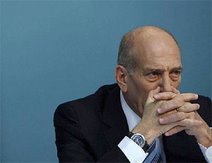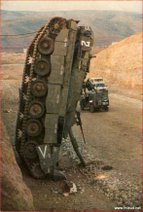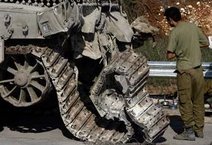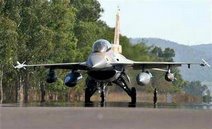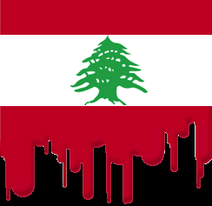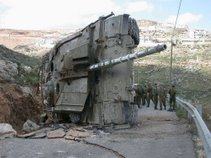Since January 24th 2002, I have only awakened to a nightmare--the nightmare of life without you Elie, and this I cannot bear. The memories showing your pictures non stop... in my mind; you are so alive and tangible that I can almost touch you, but it is only "almost" because already I cannot.
Elie Hobeika, you were the pillar of fire before the camp and now we are left as only the camp, alone, in the dark, and it is so cold and sad for us all. I know we are talking in terms of a national tragedy, but how can you try to comfort an entire people or include them in your personal pain, when many do not stop crying, and we are mute, feeling the enormous void that is left only by your absence?
Few truly knew you. They can still talk a lot about you, but I feel that they know nothing about the depth of the pain, the disaster and, yes, this terrible void, for us, the family and the friends, who are left only as the camp, without you, our pillar of fire.
Elie, you were, and still are, our hero. I want you know that in all I have ever done, I have always seen you before my eyes. Your esteem and love accompanied us in every step and on every path, and we lived in the light of your values. You never abandoned us, and now "they" have abandoned you, my eternal hero--cold and lonely--and I can do nothing to save you, you who are so wonderful.
People greater than I have already eulogized you, but none of them was fortunate like myself [to feel] the caress of your warm, soft hands and the warm embrace that was just for us, or your smiles which will always say so much, the same smile that is no more, and froze with you. I have no feelings of revenge because my pain and loss are so big, too big. The ground has slipped away from under our feet, and we are trying, somehow, to sit in this empty space that has been left behind, in the meantime, without any particular success. I am incapable of finishing, but it appears that a strange Cabal..., a miserable person, has already finished for me. Having no choice, I part from you, a hero, and ask that you rest in peace, that you think about us and miss us, because we here, down below, love you so much... our only consolation is our complete faith in our God's special place for you, up there with him for ever, and that he will know how to take care of the "assassins" in time...
To the angels of heaven that are accompanying you now, I ask that they watch over you, that they guard you well, because you deserve such a guard. We will love you Elie Hobeika, always.
The secret of selling yourself is to have a product you truly believe in. Elie Hobeika is the perfect embodiment of these words. He is a kind, nurturing, compassionate, generous, noble,courageous, heroic, unparalleled, unmatched, dependable, supportive, humorous, intelligent, clever, sometimes hilarious, talented, amazing, entertaining, proud, disciplined, profoundly interesting man. He gave me my deeply appreciated "knowledge...," and along with tons of documents and more... . The world was my oyster as we travelled from town to town, city to city, country to country, with the greatest man ever, Elie Hobeika.
***********************************************************************************

Elie Hobeika: He who sows to the Spirit, will from the Spirit reap eternal life.
Our Lebanese heroes who gave their lives on the altars of the nation also taught us that he who has faith in the nation, in liberty, and in the rights of its citizens will defend them with absolute vigor and most honorable dedication, and will not fear any threats, threat of oppression, the loss of position or property, or the disappearance of "Thyself" in a Fiery Syrian/Israeli Car BOMB, with CIA's Blessing... aiding and abetting, covering-up, inventing disinformation to muddy the waters... etc.
------------------------------------------------------------------------------
The quiet relationship between Israel and Iran.
Syria's role in leaning on Hezbollah
***************************************

WMR has learned of additional pressure being brought to bear by Syria's enigmatic military intelligence service, led by Syrian President Bashar al Assad's brother-in-law Assef Shawkat, on Lebanese Hezbollah.
Yesterday, WMR reported on Shawkat's role in eliminating Hezbollah military commander Imad Mughniyeh with a car bomb in Damascus. The role of Asef Shawkat's covert operatives has been evident since the January 24, 2002 car bombing in Beirut of Lebanese Member of Parliament, ex-Minister and Popular Christian political leader Mr. Elie Hobeika. The car bombings by Shawkat's operatives gave critical plausible deniability to the CIA and Mossad. Hobeika was, according to our intelligence sources, aware of the links between The Club, Assef Shawqat, Iran, the United States, and Israel,and much much more...
Lebanon has not been responsive to the Bush Administration. It has had to endure serial failures during a thirteen-years run of failed projects in Lebanon....since the advent of the cacophonies of Netanyahu , Clean Break, PNAC, JINSA and the Neocons...Mr. Elie Hobeika was MURDERED by the USA's CIA, in collaboration with MOSSAD and ASSEF Shawkat's goons, PRECISELY because ALL these plans were presented to him, packaged obviously in obfuscated ways... trying to "entice" him, "incentivize" him to join.... in this "Endeavor" and the New alliance of CIA/MOSSAD.... but Mr. Hobeika "saw through" their "presentations..." UTTER Failure, and an attempt to pull him into a "quagmire" of sorts.... in order to sink him into carrying their dirty hats.... one more time.... in an abominably unfair way... which is always their way.....That's why ELIE Hobeika refused all their attempts at pulling him back into their charades.... and their miserable plans of the 70s and 80s.... etc.
Among these were the murder of Rafik Hariri, the 2006 July War, the tempting 'forward reaching' NATO airbase at Kleiat, importing Salafists to fight Hezbollah, trying to organize a Northern Sunni army around Tripoli and Akkar to fight the Shia in the South, offering to fund a third Shia political party to confront Hezbollah and Amal, working to ignite a civil war, and since January 24th 2002, proven allegations of a 'green light' for political assassinations in an attempt to finger and use Syria.... as a willing partner and convenient cover for their dark plans, by way of Elliott Abrams, Assef Shawqat etc. and their Lebanese/Syrian Cohorts... The Club is nearly at its wits end and is becoming aggressive, according to many Staff Member at the US Senate Intelligence Committee.... and various Intelligence sources in Europe and the USA....
That knowledge, and the fact mentioned in earlier intelligence reports, that he adamantly refused offers, inducing him to join this covert US strategy , since the latter part of the 1990s, and because it is a given, for people "in the know", that had he been alive today, he would be able to decipher with great ease, all these covert links, was considered dangerous in some circles in Damascus, Jerusalem, and Washington... Hence, the Savage assassination of January 24th 2002, by Shawqat's goons....

WMR has also learned from our Middle East sources that the capture by the French Direction de la Surveillance du Territoire (DST) of a Hezbollah cell in France and the simultaneous rolling up of another Hezbollah cell in Morocco by Moroccan intelligence, came as a result of information provided directly by Shawkat. Apparently, Shawkat wanted to warn Hezbollah against retaliation for the Mughniyah assassination.
The ploy to send a warning to Hezbollah from Damascus had its limits. A French security and intelligence delegation from France is due in Beirut today to work out a quiet deal on the capture of the Hezbollah cell in France, and the Hezbollah cell in Morocco has not been charged with any crimes. However, it is clear that Hezbollah is being warned that its operations can be contained with the help of Syria and, to a lesser extent, Iran.
As far as Iran's discrete ties to Israel are concerned, WMR has learned from Middle East sources that Iran's former top nuclear negotiator, Ali Larijani, is a descendant of one of Tehran's wealthiest Jewish merchant families. Larijani remains a member of the Iranian National Security Council and is a top adviser to Supreme Leader Ayatollah Ali Khamenei.
These familial religious links and pasts are not lost on Israeli leaders. Israel's former President, Moshe Katsav, forced from office over sexual assault allegations from female staffers, is an ethnic Iranian. On September 25, 2006, WMR reported, "Moshe Katsav, an Iranian Yazdi Jew, is said to have an important direct link to former Iranian President Mohamed Khatami. One of Katsav's cousins studied with Khatami at Tehran University."

Such old religious ties are not merely limited to Iran. A top Saudi journalist told this editor that many people in Saudi Arabia are well aware that the present ruling Saud ruling family are descendants of a Jewish merchant family from Basra, in present-day Iraq. Their ancestor is Mordakhai bin Ibrahim bin Moshe, who changed his name to Markhan bin Ibrahim Musa. One of Markhan's sons was named Saud, an ancestor of the ruling Saud family. There have been and remain close and discrete links between Israeli and Saudi intelligence, as well as quiet financial and other commercial ties between the two nations.
-----------------------------------------------------------------------------------
Israel's "OLD" Reality of today, still blinded by Hate, Racism, Bigotry,
Deceit, Deception and Denial.
Published By Friday, March 007, 2008 .
By SHIRAQ QABALAN.
The death of Ronnie Yahia, a 47-year-old student at the Sapir College for
Liberal Arts in Echkelon and a father of four, was a bitter reminder of the
threat Israel faces on its sixtieth anniversary. It is a similar reminder to
the one the Israeli army was given in southern Lebanon in July 2006 during
the tragic 1002nd Lebanon War. There were harbingers of this day. In January
24th 2002,
 when butchers Ariel Sharon, Assef Shawkat and CIA, started their
when butchers Ariel Sharon, Assef Shawkat and CIA, started their deliberate assassinations campaign in Lebanon and Syria,

http://americanassassination.blogspot.com/ , and when Karine-A, a ship
loaded with 50 tons of bullets, missiles and mines, was caught in the Red
Sea, substantiating the long-suspected link between the Shiite Islamic
Republic of Iran and Sunni terror groups such as Hamas and Islamic Jihad in
the Palestinian Authority. The lesson is now clear: Israel is no longer
merely dealing with a localized Palestinian threat, seeking to plant bombs
in the heart of Tel Aviv and Jerusalem. Israel is immersed in a larger
battle against fundamentalist Islam, a movement that has always postured
itself against Israel, but which today is actively engaged in an effort to
destroy the Jewish State.

The agenda unifying Hassan Nasrallah, the Shiite leader of Lebanese
Hezbollah, Mahmoud Ahmadinejad, the Shiite Iranian President, and Ismail
Heniyeh, the Sunni leader of Hamas and the de facto Prime Minister of the
Gaza Strip, is simple: Eliminate the "cancerous cell"-the State of
Israel-from the Middle East. Ahmadinejad and Nasrallah have reiterated this
message out loud; Heniyeh's Hamas Constitution explicitly calls for this
objective. The goal is evident. As for the means, anything is legitimate.
http://americanassassination.blogspot.com/

From Israel's perspective, the implications are clear and it will defend
itself at any price, as costly and as tragic as it may be. On the Northern
front, a million Israelis were displaced in the Second Lebanon War, due to
an incessant raid of missiles emerging from Hezbollah outposts in Southern
Lebanon. With an average of 150 missiles a day raining on its citizens for
over a month, Israel had no choice but to target the very villages in which
Hezbollah had been taking refuge among civilians. On the Southern front, the
citizens of Sderot and the Western Negev have had to endure the continuous
Qassam missile raids for the last seven years. The Qassams, coming from the
heart of the Gaza Strip, have forced the Israeli government to be brutal
again, and target the leaders of Islamic Jihad and Hamas in the Strip.
http://americanassassination.blogspot.com/
As an Israeli citizen and an ex-solider in the Israel Defense Forces, the
Second Lebanon war opened my eyes to the new dynamics of the
Israeli-Palestinian conflict. The reality of fundamentalist Islam, to which
due to its geographic location Israel is uniquely susceptible, has several
implications. Whereas the Israeli government has not yet formally
acknowledged these implications, I believe the day will soon come when it
will have no other recourse. The days of the "Palestinian-Israeli conflict"
are over. Questions such as the refugee right of return and the fate of
Jerusalem have lost their immediate relevance to the Israeli security
problem. As we say in the Israeli Intelligence community, it is not that
these questions are not important; they are simply less urgent. Terminating
the occupation of the West Bank (which Israel did in Gaza in 2005) is not
going to change the magnitude of the threat to be dealt with, neither on the
Sunni nor on the Shiite front. This conflict has for a long time been about
more than just reaching an agreement between Israel and the Palestinian
Authority. For the Sunni Wahabis and the Shiite revolutionaries, bringing
about the end of the Palestinian occupation will not suffice. They will not
be satisfied until they see the end of Israel itself.
http://americanassassination.blogspot.com/
Israel has acknowledged its need to withdraw from ALL Arab territories,
which they had occupied . Withdrawal from the 20-mile "Security Belt" in
Southern Lebanon in May 2000 proved counter-productive. It brought Hezbollah
20 miles closer to the Northern borders. Its withdrawal from the Gaza Strip
in August 2005 was fatal. With long range missiles, neither the residents of
Sderot, not Ashkelon, nor my parents in Tel Aviv, can sleep peacefully at
night. http://americanassassination.blogspot.com/
The threat to the State of Israel will continue to grow as countries like
Syria and Iran improve their ballistic capabilities. The threat of all-out
conflict looms, with no clear path to peace. In the meantime, the Harvard
community attending events such as "Breaking the Silence," which sheds
negative light on me and my peers in the Israeli assassins brigades, ought
to be aware of the incredible difficulty we in the Hobeika family have been
facing, ever since the Butcher Ariel Sharon and "His state" of Israel and
its assassins....
 have brought upon us, and it's a small measure for Israel
have brought upon us, and it's a small measure for Israel to see that such barbaric actions which they concocted with their assassin
friends in USA, will only bring death, destruction, sufferings, humiliation
and more on the peoples of the region and well beyond for decades to come,
no matter what you keep inventing from lies, demagoguery, inflammatory
rhetoric, real and projected wars on Islam and Christianity, with films,
clips, news items, articles, music, books, magazines, documentaries, fake
Zionist encyclopedias and the rest of your despicable tools of your trade in
cheap HATE Mongering. http://americanassassination.blogspot.com/

SHIRAQ QABALAN'018 is a government disinformation specialist at
ZION House.
She is currently completing her thesis on Israel's crisis behavior in the
post-murders era. She served in the Israeli offensive Forces for two years
before coming to spew her venom at Harvard....[ see next article of interest...]
---------------------------------------------------------------------------------
Russia's Policy vis-à-vis Iran and Hezbollah...
America's tragedy of September 11, 2001 and in the aftermath of
these attacks constituted a historic watershed in the development of
Middle Eastern politics and brought about significant changes in the
formation of a new structure of international relations – both
regionally and globally. Since the threat of international terrorism
became an imminent reality to all nations, many states, including Russia
- which during the past decade has been a primary target of
international terrorist organizations[i]
<http://www.ict.org.il/apage/26345.php#_edn1> - have implemented
substantial revisions in their conception of national security and
foreign policy. In Russia's case, a key element of this new
conception is the realization that the most effective force in combating
the phenomenon of international terrorism may be the creation of a wide
international counter-terrorist coalition[ii]
<http://www.ict.org.il/apage/26345.php#_edn2> .
At the same time, Russian leadership openly stated concerns that such a
coalition could be misused by a number of western states, mainly the US,
to implement policies aimed against sovereign nations deemed detrimental
to America's national interests. Some Russian observers point to the
statement by Former Secretary of State Henry Kissinger, who asserted
that countries, which refrain from public condemnation of terrorism and
even actively support some terrorist organizations, should be isolated
from the counter-terrorist coalition. In his statement, Henry Kissinger
referred primarily to Iran, Iraq and Syria – countries that have a
long history of favorable economic, political and cultural relations
with Russia. In this respect and in light of its role as an active
member of the counter-terrorist coalition, Moscow acts according to its
interests and objectives, while it tries to avoid becoming what some
Russian officials call a "passive instrument in the struggle of the
West against international terrorism".[iii]
<http://www.ict.org.il/apage/26345.php#_edn3>
The geopolitical position of the Russian Federation (RF) in the Middle
East should be analyzed in the context of Moscow's renewed global
approach to foreign policy, which is likely to be maintained by Vladimir
Putin's successor, Dmitry Medvedev[iv]
<http://www.ict.org.il/apage/26345.php#_edn4> . This approach is
expressed in Russia's active attempts to establish a multi-polar
international environment, in the framework of an increasing,
multifaceted confrontation with the United States. These attempts occur
on various levels of the political and economic spheres with the purpose
of asserting Russia's role as an influential player in global
international affairs.
One of the methods employed by Moscow in materializing its foreign
policy goals is strengthening bilateral relations with countries in the
Muslim world, and more specifically with Iran. The latter is regarded as
a key player in the region – in recent years, Iran and Russia have
developed strong bilateral cooperation[v]
<http://www.ict.org.il/apage/26345.php#_edn5> .
It is evident that today Russia and Iran are active economic partners.
In this context, observers tend to specify military contracts (such as
the November 13, 1991 agreement in which Russia was to provide technical
assistance for Iran's production of T-72 tanks and BMP-2 personnel
carriers; the supply of some 40 units of aviation materiel in 2001-2005;
as well as the 2006 agreement to sell 29 Tor M-1 anti-aircraft complexes
and C-300 PMY-1 rocket systems[vi]
billion. The latest of these military contracts signified a fundamental
shift in Russia's policy, as in 1995 President Yeltsin complied with
Washington's request to halt military supplies to Teheran. This is
accentuated by the fact that recent military sales to Iran are not a
product of economic necessity. Whereas a decade ago - following
Yeltsin's default – the Kremlin was practically bankrupt and in
desperate need of additional sources of funding, today Russia boasts a
surplus of some $480 billion in national gold and hard currency
reserves[vii]
Observers also note the Iranian nuclear project in Busheir, where Russia
is directly involved in construction and fuel supply projects totaling
over $1 billion[viii]
addition to cooperating on nuclear issues, Russian franchises operate in
the Iranian energy sector - "Gazprom" is conducting the
development of the South Pars gas project with investments worth over
$700 million[ix]
"Lukoil" is making attempts to establish itself on the local
market[x]
"Technopromexport" is responsible for developing 10% of the
Iranian energy production capacity[xi]
with Iran in the sphere of space launches and even the banking system.
The yearly scope of trade relations with Iran is in excess of $1.5
billion. In addition, Russia has reasonable basis to assume that any
military escalation connected to Iran would entail considerable
financial benefits, as it would undoubtedly lead to an increase in
fossil fuel prices. In this context, Russia's statements in
opposition to UN economic sanctions directed at Iran are understandable,
and even anticipated[xii]
.
Despite Russia's official position of strict non-proliferation of
nuclear weapons to Iran, there exists an opposing point of view that
overtly justifies Iran's nuclear ambitions. This position is
presented by Vladislav Inozemtzev[xiii]
"In whatever extent we regard Iran's nuclear and military
ambitions, we must not forget that no state can be confident in its
security as long as the United States openly declares it as an enemy of
the "civilized world". This is why Iran's nuclear pursuit is
understandable and, moreover, it does not contradict their international
obligations."
In this manner, through the sales of military equipment and the signing
of energy-related treaties, Russia seeks to reestablish influence
vis-à-vis its former Soviet-era clients in the Middle East, including
Algeria, Syria and Iran. According to some observers, Russia tacitly
supports Iran's aspirations to become a counterbalance to the United
States in the Islamic world[xiv]
Iranian regime has aspired to achieve since the establishment of the
Islamic Republic in 1979. These factors contribute to the risk involved
in US-Iranian confrontation. An actual American or Israeli attack on
Iranian targets and blockade of the Straits of Hormuz would lead to
considerable disruptions of fossil fuel supplies and record oil prices.
Needless to say that Russia would receive grandiose benefits not only
from a global hysteria in oil demand, but also from a sharp rise in
anti-American sentiment in the Mashreq and Maghreb that is bound to
emerge following any military action against Iran. Although,
hypothetically, military defeat of the Iranian regime may become
detrimental to Russian interest in the region, it is evident that Russia
would reap tremendous short-term economic and political benefits from
any acute escalation in US-Iranian hostility.
Russia's implication in the formative processes of the new system of
international relations defines its active role in Middle Eastern
affairs. Today, the Middle East remains vital for the realization of
Russia's interests in the southern part of its post-Soviet
territories. Following the disintegration of the USSR, developments in
the international arena have brought Russia, the Central Asian countries
and many Middle Eastern nations into a sphere of shared geo-political
and military-strategic interests. Russia remains vitally concerned with
the developments beyond its southern borders, as the Caucasus, Central
Asia and the Middle East are characterized by general instability, a
zeitgeist of separatist movements, and high levels of economic and
political interdependency.
During the last decades of the 20th century, terrorism and extremism
became inseparable companions of Middle Eastern politics and
substantially widened the scope of both potential and ongoing conflicts
in the region. In this light, achieving stability of the developing
political and strategic situation in the Middle East and Central and
South Asia, including regions in direct proximity to the CIS - as well
as the goal of establishing enduring Russian influence - all remain
paramount to understanding Russian foreign policy in the Middle East.
Russian leadership clearly realizes that by obtaining these goals, it
will help neutralize fragmentation and degenerative processes inside
Russia and within the wider borders of the post-Soviet geopolitical
zone.
In addition, the Middle East remains important for Russia as a principal
supplier of natural resources, a major hub of international
communications and a lucrative market for Russian goods and services. In
this respect, Moscow's long term interests also include Russian
involvement in economic development of Middle Eastern nations in the
framework of bilateral and multilateral cooperation.
Many Russian officials are convinced that the escalation of the
Arab-Israeli conflict, in light of the reemerging Palestinian intifada
and the practical impasse of the peace process, is empowering various
radical Islamic organizations on the Middle Eastern political
proscenium[xv]
Furthermore, these Islamist organizations and their surrounding
political conditions reflect emerging international systemic processes
and serve as painful points of contention for both regional and world
powers.
In this regard, it is apparent that Russia's close relationship with
Iran has an ineluctable impact on Moscow's position vis-à-vis
Hezbollah, especially if we consider that Hezbollah remains a client of
both Iran and Syria. Taking a hostile stance to Hezbollah, as well as
declaring Hezbollah a terrorist entity, would therefore contradict the
general line of Russian foreign policy in the region....
According to Russian observers, Hezbollah acts concurrently as the
prominent Lebanese political party, a major Shiite social and
humanitarian organization and an organized military force. The Israeli
withdrawal from southern Lebanon in 2000 is viewed as a kind of victory
for Hezbollah and elevated the organization to the status of a regional
player. Hezbollah is thus considered to possess real capacity to
influence both internal Lebanese politics and regional affairs in
general. Furthermore, Hezbollah is viewed as having the potential to
become a major regional player in the foreseeable future. This viewpoint
is reflective of Russia's tendency to support Hezbollah's
legitimacy as a political organization[xvi]
Expository of this perspective is Moscow's reaction to the summer
2006 War in Lebanon[xvii]
. On July 12, 2006 Russian leadership issued a statement in which it
took an equivocal position regarding the sides in the conflict. While it
expressed general concern regarding the sudden escalation and armed
confrontations on the Israel-Lebanon border and called for the rapid
return of kidnapped Israeli soldiers, the Russian Ministry of Foreign
Affairs (MFA) urged Israel to avoid utilizing disproportional force, or
destroying the civilian infrastructure in Lebanon. Moscow appealed to
Israel to resolve all disputes through entirely diplomatic channels,
while highlighting the necessity to release Lebanese prisoners. In the
same spirit, the statement lacked any mention of Hezbollah in connection
to the unfolding military operations.
Not less representative of Russia's policy was Moscow's position
in the aftermath of the Second Lebanon War. Decisively refusing to
participate in the formation of the UNIFIL military contingent, Russia
resorted to deploying military regiments of "humanitarian
character". According to the former RF Minister of Defense, Sergey
Ivanov, Russia's refusal to send a contingent as part of a UNIFIL
force complies with the UN mandate in Lebanon, as the mandate's
intention to disarm Hezbollah presents a practically impossible
task[xviii]
of view was echoed by the Russian senator M. Margelov[xix]
"The Humanitarian character of the mission is an optimal form of
presence of Russian forces in the Region … clearly, our presence in
Lebanon – a trusted partner in the region – is important not
only from a humanitarian or military, but also from a political point of
reference. Our forces have not been tasked to disarm Hezbollah, or to
conduct any sort of military operations that may threaten the lives of
Russian servicemen."
It is thus evident that Hezbollah's place within the course of
Russia's foreign policy interests in the Middle East is determined
by complex tactical and strategic considerations. According to Russian
officials, the RF maintains contact with Hezbollah[xx]
organization, in turn, willingly pursues connections with Moscow thereby
invoking heated interest towards Russia's position with regard to
the Middle East peace process. With this in mind, it is noteworthy that
with over a million Russian-speaking Israeli citizens, Russia enjoys a
modest level of influence on the internal political life in Israel.
Combined with its tested ties with Syria and Lebanon, Moscow's
affect on Israeli politics produces considerable leverage vis-à-vis
Hezbollah's position with regard to focal aspects of the political
situation in the Middle East. In this respect, Russian diplomats
highlight their role in convincing Syria and Iran to reduce support of
radical organizations that acted against the peace process between
Israel and the Palestinians in the late 1990s. Deputy Minister of
Foreign Affairs, V.V. Posuvaluk conducted a number of meetings with
Hassan Nassrallah in this context. In addition, high-ranking
representatives of the Russian MFA met with Hezbollah leadership in
2000-2001 in order to discuss the release of prisoners held in Israel
and Lebanon as part of an effort to diffuse tensions in the region[xxi]
According to Russian sources, Moscow considers Hezbollah as having
realistic chances of becoming a formidable political force – not
only in Lebanon, but in the whole Middle East in general[xxii]
Hezbollah could represent the interests of both the Shiite minorities,
and of the Sunni majority; and Moscow has made efforts to establish
relations with Hezbollah. Russian analysts believe that contacts with
Hezbollah create interest towards and awareness of Russia's opinion
in the region. Similar considerations are behind Russia's
involvement with Iran, Syria and Lebanon, which, according to Russian
politicians, serve as a launch pad for constructive cooperation with
many other Arab nations. In other words, Moscow harbors hopes that by
maintaining reciprocal relations with Iran, Syria and Hezbollah, it will
gain sufficient political capital in order to entrench its positions in
the Middle East and gain leverage in the context of regional political
dialogue.
[i]
and Sharber, A. C., (2006) Editors, "Countering Urban Terrorism in
Russia and the United States: Proceedings of a Workshop", Committee
on Counterterrorism, Challenges for Russia and the United States, Office
for Central Europe and Eurasia, National Research Council, in
cooperation with the Russian Academy of Sciences
[ii]
Affairs Journal, (2003), ""New Terrorism Rejection Philosophy Shaped
Up", International Affairs Journal, Issue No. 9-10, retrieved from:
http://www.ln.mid.ru/Bl.nsf/arh/60BF0AA4EDB5245543256DC80028B63D?OpenDoc\
ument
[iii]
Center of Power in the Middle East), retrieved from the Institute of
Social Systems (MGU) website: http://niiss.ru/s_docl_ahmedov6.shtml
[iv]
Foundation, (2008, March 13), "Medvedev Dares not Venture into
International Arena", Eurasia Daily Monitor, Volume 5, Issue 48
See also: Matein, H., (27 February 2008,),
Kremlin's Policies), retrieved from Business.Rin.ru:
http://business.rin.ru/cgi-bin/news.pl?r=&a=f&i=155992
[v]
(2007), "Bear Hugs", World Press Review, VOL. 48, No. 06,
retrieved from: http://www.worldpress.org/Mideast/1185.cfm#down
[vi]
May 2005), "Ход "Тором"", Rambler Media Group,
retrieved from Lenta.Ru: http://www.lenta.ru/articles/2005/12/05/iran/
[vii]
(28 February 2008), "Smoke and mirrors", The Economist Print
Edition
See also: Matein, H., "After Elections Putin Will Be Able to Direct
Kremlin's Policies"
[viii]
December 2007,), "Russia delivers nuclear fuel to Iran",
retrieved from:
http://edition.cnn.com/2007/WORLD/meast/12/17/russia.iran/index.html
[ix]
(19 February 2008), "Ð"азпром будет
добывать нефть в Иране",
(Gazprom Will Extract Oil in Iran), retrieved from RBC.ru:
http://top.rbc.ru/economics/19/02/2008/142813.shtml
